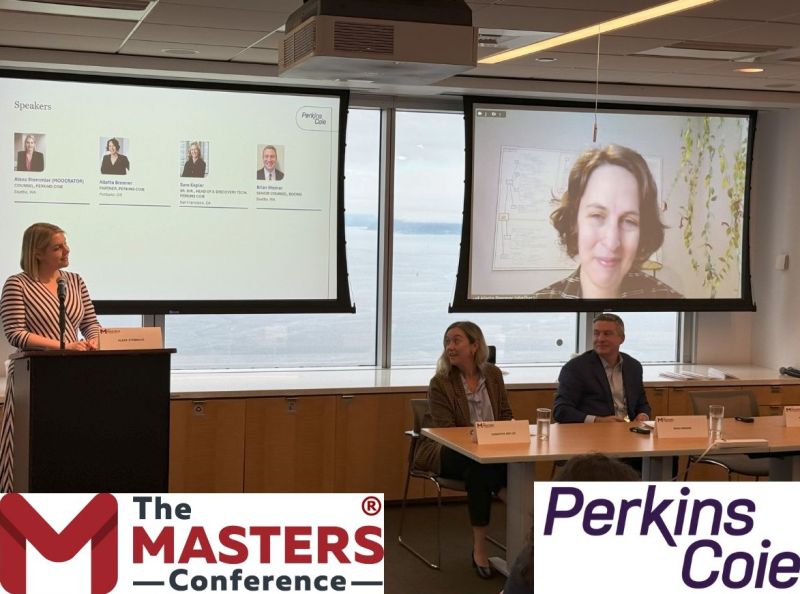eDiscovery Daily Blog
Current Challenges in Modern eDiscovery: Insights from The Masters Conference in Seattle
By Mark Espanet
On September 18th, I had the opportunity to attend The Masters Conference in Seattle, WA, for my second time, hosted by Perkins Coie. This year, I was struck by how much the technology landscape in eDiscovery has evolved, especially with the rapid integration of Generative Artificial Intelligence (GAI). While GAI was a major theme throughout the conference, one session stood out for its exploration of the broader challenges faced in modern eDiscovery.
Session Title: Current Challenges in Modern eDiscovery
Speakers:
- Alexandra (Alexa) Stemmler, Counsel, Perkins Coie (Moderator)
- Alletta Brenner, Partner, Perkins Coie
- Samantha Kepler, ESS Sr. Manager of eDiscovery Program Management, Perkins Coie
- Brian Werner, Senior Counsel, Boeing
Generative AI in eDiscovery: A Double-Edged Sword
Alletta Brenner opened the session by acknowledging the growing buzz around Generative AI and its potential in eDiscovery, but she did not shy away from discussing the complexities that accompany it.
GAI is often seen as a shiny new tool that promises to streamline workflows, automate tasks, and simplify legal processes. However, as Brenner pointed out, there are significant hurdles to overcome. One of the biggest challenges lies in language models, specifically their ability to interpret evolving human language accurately. Since legal documents are often context-dependent, ensuring that AI can capture nuances and subtleties is critical. As of now, Generative AI is not yet at the stage where it learns from or applies real-world examples effectively—“We’re not there yet,” Brenner emphasized.
Brian Werner echoed this cautious approach, noting that both in-house and outside counsel are still hesitant to adopt GAI. While policies surrounding AI in eDiscovery are beginning to take shape, it’s clear that legal teams are treading carefully.
Key Takeaways on Generative AI:
- GAI simplifies many aspects of legal work but struggles with context-specific documents.
- AI adoption remains slow due to cost concerns, with teams saving on review costs but spending more on quality control.
- A breakthrough moment, such as a high-profile court case validating AI, could shift perceptions—but that moment has yet to arrive.
Court and Cost Considerations
Brenner also highlighted that court testing will be a major factor in determining how GAI is utilized in eDiscovery. A high-profile case involving AI could be the catalyst to change the negative stigma surrounding AI’s role in the courtroom. However, until that happens, legal professionals remain cautious.
Cost, as always, plays a significant role. While GAI promises cost savings in some areas, teams are finding that it leads to increased quality control expenses. Werner added that while AI can reduce review costs, these savings are often offset by the higher cost of ensuring the data reviewed by AI meets defensibility standards.
Modern Data: The Ever-Evolving Challenge
As the conversation shifted from AI to modern data challenges, Samantha Kepler and Brian Werner discussed the growing complexity of handling smartphone data and corporate chat applications like WhatsApp and Microsoft Teams.
Kepler stressed the importance of balancing targeted collections with over-collection, as storage fees for excess data can add up quickly. However, over-collection also has the benefit of defensibility, preventing teams from needing to recollect data later. Privacy considerations remain top of mind, as legal teams must navigate how to collect and store sensitive information while complying with regulations.
The panel also explored the custodial interview process, where handling custodians’ concerns about privacy and data collection is crucial. Kepler emphasized the importance of the custodian’s privacy concerns during the collection process while still collecting all potentially relevant information.
The Gaps in Mobile Data and the Future of AI
One key question raised during the session was: Why are we focusing on AI when we’re still figuring out how to manage modern data? The explosion of mobile data apps has left many legal teams grappling with how to process information from platforms like WhatsApp and Teams. This perceived gap in modern data review needs to be addressed before AI can fully step in to streamline workflows.
As legal standards and workflows continue to evolve, it’s essential for teams to not only familiarize themselves with GAI software but also stay up-to-date with emerging policies around AI in eDiscovery.
In Conclusion
The session at The Masters Conference provided a well-rounded discussion on the current state of modern eDiscovery. While Generative AI holds immense potential, it’s clear that the industry still faces significant hurdles related to language interpretation, cost, and defensibility. In the meantime, addressing the challenges posed by modern data from smartphones and chat applications remains a priority. For now, legal teams should continue learning about AI platforms while staying cautious and informed about how they can be applied in the ever-evolving eDiscovery landscape.
Attending this conference gave me a fresh perspective on how rapidly technology is shaping the legal industry and the ongoing challenges we need to navigate in eDiscovery. I look forward to seeing where the future takes us.

